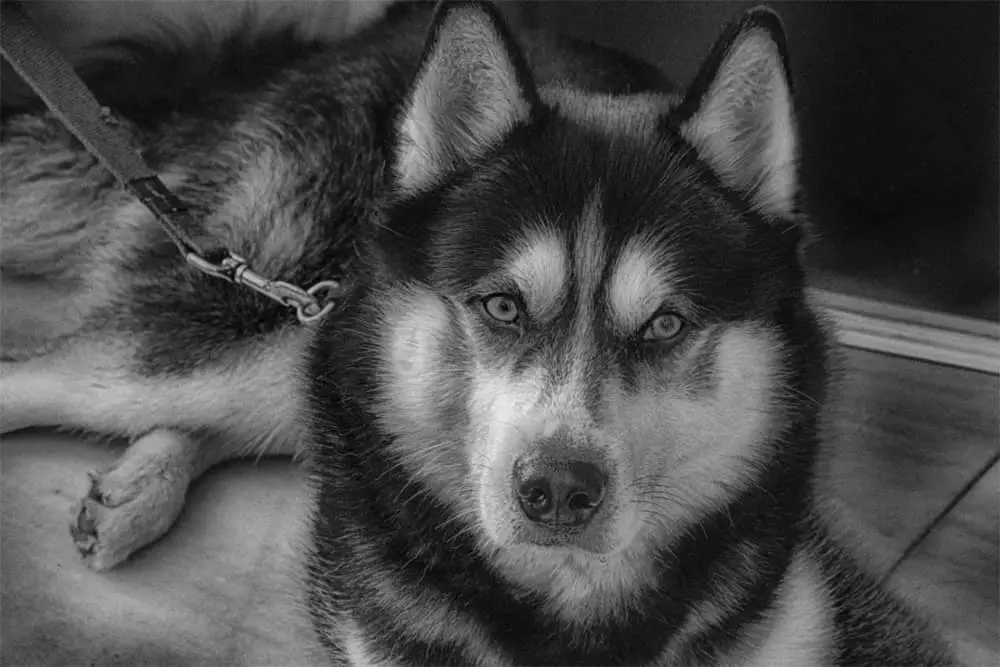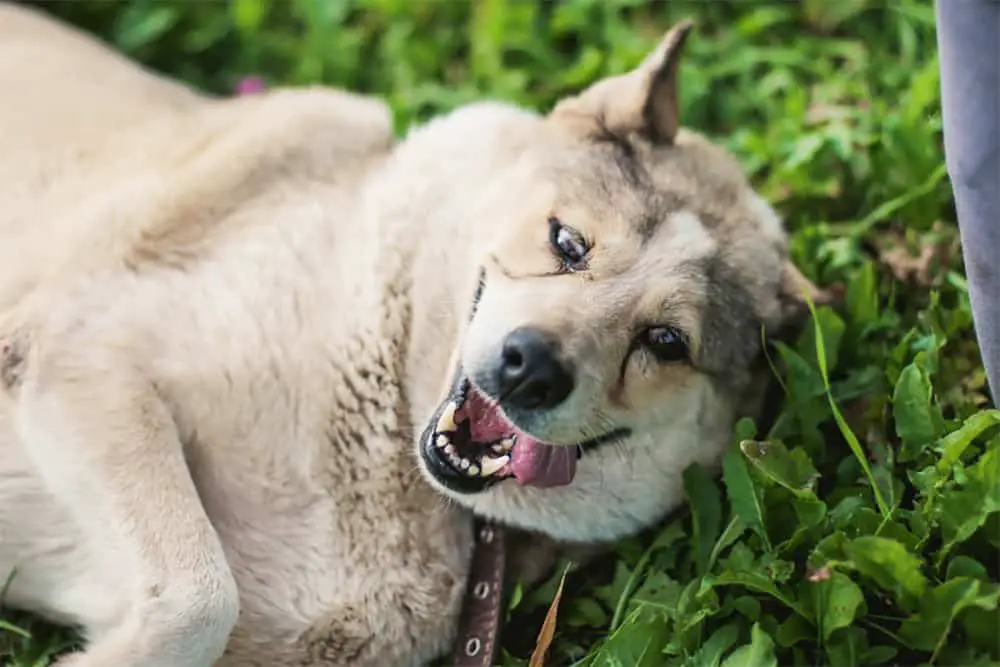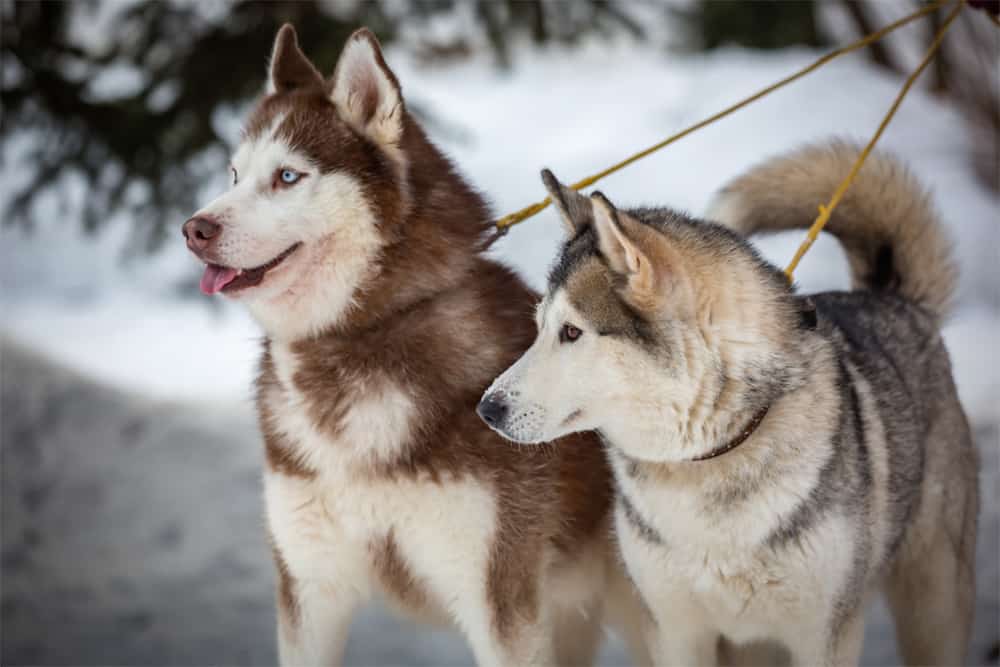Huskies, like any animal, can gain weight – and sometimes too much of it.
Obesity can lead to a whole host of health issues, and should never be left untreated, especially in huskies.

If you suspect that your dog is overweight, there are a couple of signs to look out for:
- You should be able to feel all of your huskys’ ribs when you run your hand along their side. This might be covered by a thin layer of fat, but if this layer is so thick that you can’t feel them very easily, your husky is probably overweight.
- Your huskies chest should be wider than their abdomen – if your dog is overweight, it will be hard to tell their chest apart from their stomach in terms of size
If your dog has either of these symptoms, read on! We’ll talk about some of the potential causes of this.
Too Many Calories
Similar to humans, dogs can have too many calories, and this can lead them to gain weight. If we consume more calories than our body can break down in a day, our body puts these calories aside, forming fat deposits.
The same happens with dogs! This is why they shouldn’t have more calories than they should.
How Many Calories Should I Give My husky?
Most dogs should eat between 25 and 30 calories per pound of their body weight, every day. Too little and your dog might be underweight, and too many and your dog will probably be overweight.
You should always refer to the recommended feeding amounts listed on your dog food – this helps you to measure your dogs’ food and calorie intake and ensures that they don’t consume too much or too little.
However, it is important to keep in mind that every dog is different, and these guidelines might not always be correct. If you notice that your dog starts gaining weight even though you’re feeding them the recommended amount, it’s probably a good idea to reduce your dog’s portions and consult with your vet.
Too Many Carbohydrates
Too many carbohydrates can be bad for anyone, let alone your husky. Too many carbohydrates in your huskys’ diet can cause insulin spikes, causing your husky to get hungry more often and beg for food.
How Many Carbohydrates Can My Dog Have?
Huskies should really have limited carbohydrates within their diet. Cheap dog food tends to have more carbohydrates in, as carbohydrates are way cheaper than protein – meat can be expensive.
If you’re feeding your husky cheaper dog food and they’re gaining weight, it might be an idea to try a slightly more expensive brand with a healthier composition and fewer carbohydrates in their food.
Your dog really should be eating food that gives them a balanced diet, as this is where they get all of their energy! If they aren’t burning up all of the carbohydrates that their food provides, it’s only natural for them to gain weight.
Not Enough Exercise
One of the leading causes of obesity in huskies is a lack of exercise. If you haven’t taken your husky for a long walk in a while, you should probably consider grabbing their harness and taking them out!

Huskies are naturally built to survive in harsh environments and therefore, they have a lot of energy to burn… especially if they’ve been cooped up inside all day!
How Often Should I Walk And Play With My Dog?
As a general rule of thumb, you should give your husky at least two hours of exercise per day.
There’s a catch here though – after a while of having their minimum exercise requirement, your dog will become fitter with stronger muscles and even more energy to burn – so you’ll have to walk them even more!
Water Retention Or Bloating
What Is Water Retention?
Water retention, or ‘ascites’, occurs in dogs when they have an abnormal and excessive build-up of fluid in their abdomen. Ascites is basically fluid that is moving freely around your dogs’ abdomen – although it shouldn’t be.
This can be caused by a variety of underlying conditions, and if you suspect that your dog has ascites, you should take them to a veterinary professional as soon as you can.
As well as weight gain, other symptoms of ascites are:
- Difficulty breathing
- Lethargy
- Lack of appetite
- Vomiting
- Discomfort
- Panting
- Swollen abdomen
If your dog has any or multiple of these symptoms, you should take them to the vets straight away. These symptoms usually suggest a serious underlying health condition that needs urgent treatment, and you should get your husky looked at urgently.
Bloat
Sometimes our stomachs become bloated, and this can happen with dogs too. This can be a symptom of a serious underlying health condition in dogs, however, and so bloating in dogs should never be ignored.
‘Bloat’, also known as Gastric Dilatation-Volvulus (GDV), occurs when your dogs’ stomach is filled with gas, food or fluid, which causes the stomach to twist. This can be a deadly condition, yet it is also easily preventable. If your dog has GDV, it is a medical emergency and should not be ignored.
Symptoms of GDV include:
- Panting or rapid breathing
- Inability to stand or collapsing
- A painful abdomen
- Distress
- Excessive drooling
- Inability to vomit and attempts to vomit without any success
- Swollen or distended (when it comes down lower than it should) abdomen
Once again, if your dog has any of these symptoms, taking them to the vet as soon as possible is incredibly important, as bloat is often fatal when untreated.
Hypothyroidism
What Is Hypothyroidism?
Hypothyroidism is a disease found in a wide range of animals, including humans. Hypothyroidism occurs in dogs that produce a lower number of thyroid hormones than they should.
Larger dogs, including huskies, are more prone to hypothyroidism, so this could explain your huskys’ weight gain.

Some symptoms of hypothyroidism are:
- Your dog gaining weight
- Your dog being less active, getting tired easier, or sleeping a lot
- Excessive fur shedding and a dry, dull coat
- Having a skin or ear infection
- Thinning fur or hair loss – this can mainly happen over their head, legs, and trunk
- Scaly skin
- Skin thickening or darkening – this will happen in areas that rub against each other, such as your dogs’ groin or armpit. This can also happen around the skin or head.
- Your dog getting easily cold or always seeking out warm spaces
If you suspect that your husky has hyperthyroidism, you should always take them to the vet so that they can receive the appropriate treatment, ensuring that the condition doesn’t worsen.
What Causes Hypothyroidism?
Your husky will have hypothyroidism if his/her thyroid gland shrinks. These glands can be found in your huskys’ neck.
These glands are responsible for making hormones – these hormones can affect functioning in parts of your huskys’ body, including their weight.
Hypothyroidism can lead to weight gain in huskies as they need thyroid hormones in order to make sure that their metabolism is working in the way that it should.
Faster metabolisms will break food down faster, which is why people with faster metabolisms tend to be skinnier.
Having a thyroid hormone deficiency leads to weight gain as a result, because without the thyroid hormone your huskys’ metabolism will slow, leading to fat deposits and weight gain.
How Can I Treat Hypothyroidism?
Hypothyroidism doesn’t have a cure, but it can be treated. Dogs with hypothyroidism are treated with thyroid hormone replacement therapy.
Final Thoughts
The best way to avoid weight gain in huskies is to provide them with a healthy, nutritious diet that fits their needs.
Even if your husky doesn’t seem to be suffering too much with all of their extra weight, you should still take them to the vets to be looked at. Your vet can advise you as to whether you need to change your dogs’ diet, or if you need to give them any specific medication in order to help their weight.
An overweight dog will not have as much of an enriched life as dogs with healthier weights, as they aren’t able to take part in as many activities as other dogs do, and later on in life might have to have some dietary restrictions.
If you notice something about your husky that isn’t normal, it’s always super important that you get them to the vets as soon as possible. Some illnesses are hard to identify, and untreated health problems can be fatal!




